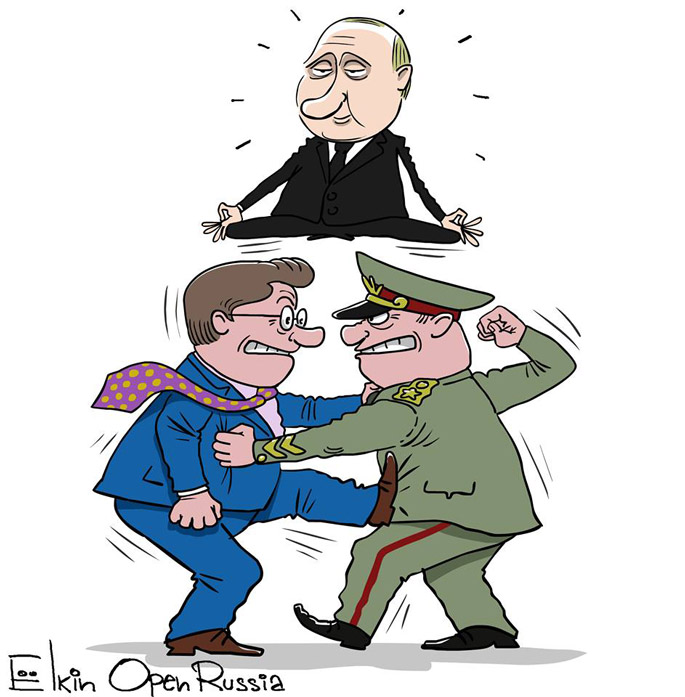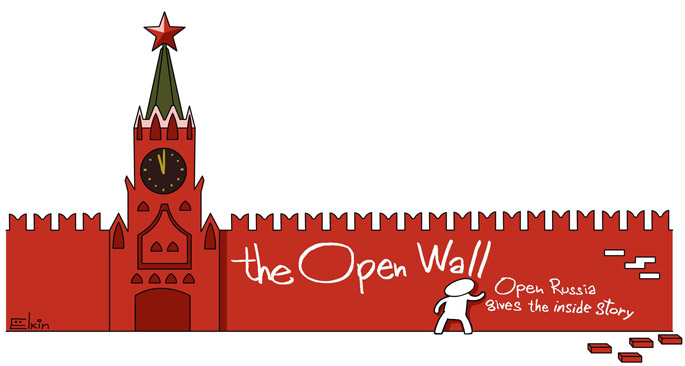The Referee
The Referee
The president recently stepped into the ring, to referee the fight between business and law enforcement. The result was a foregone conclusion.

Vladimir Putin decreed that 24 March should be the day of saying all the right things. First there was a speech at a plenary session of the Board of the Public Prosecution Service: “We are making big efforts to improve the business climate and strengthen guarantees for entrepreneurs’ rights, to protect them from unlawful pressure from law enforcement personnel.”
In the audience were 317 prosecutors and judges from all the Russian regions, but did they (or anyone) believe what they were hearing?
“Honesty, and rejection of all forms of corruption must be the norm for prosecutors. You must respond rapidly to all reports of Prosecution Service officers violating anti-corruption rules, and carry out thorough, full and objective investigations of these reports.”
On the platform was Prosecutor General Yury Chaika; you remember him, that incorruptible public service employee whose sons recently appeared in an incriminating documentary film produced by Alexei Navalny’s Anti-Corruption Foundation, engaged in foreign property dealings, mafia links and money laundering. And they haven’t been prosecuted for anything …
Later that day, the president had further words of comfort for the business community, at the first session of the working group to monitor and analyse law enforcement practice in business (a new platform set up approximately one month ago by the government, for dialogue with business): “Business people say that law enforcement personnel exaggerate or overstep their powers, and in so doing, destroy the positive business climate we have been working to build.”
It is difficult to work out what exactly the president means by a “positive business climate.” It appears not to include the almost total collapse in Foreign Direct Investment, on his watch.
source: tradingeconomics.com
Speaking after the president, Sergei Ivanov, the head of his administration and of the working group, explained the concessions that businessmen might now expect. Firstly, any material evidence, which had been confiscated by investigators – servers, documents, goods etc – would be returned within a reasonable period. Secondly, the minimum threshold value of damages could be increased. Thirdly, a businessman could be exempted from a penal sentence for a first offence, and if he has voluntarily compensated all concerned for damages (but if he does not agree with the damages established by the investigators, then he will still end up in prison). Fourthly, business people will be entitled to have their lawyers visit them in pre-trial detention in order to keep their businesses afloat. Fifthly and finally, Ivanov proposed that sentences for business people in fraud cases should be determined not on general principles, but according to the nature of their business.
It all sounded so positive. But Jana Yakovleva, head of the advocacy group Business Solidarity, who herself spent seven months in pre-trial detention on a prejudicial charge, found no cause for optimism: “Business people want fairness. Commuting their sentence is not going to preserve their property … The essence of the conversation should not be ‘how can we punish them less severely?’ but are they guilty or not. It seems that the whole working group on the links between business and the law enforcement agencies, are in agreement that business in Russia is criminal, but because there are too many to punish, they agreed to punish them less. We do not agree with this.”
Likewise, Tatyana Stanovaya, director of the analytical department of the Centre for Political Technologies, did not believe in the idyllic parity dreamed up by the Kremlin where four notable businessmen under the supervision of officials from the presidential administration sit down to negotiate with four notable law enforcers [siloviki]: “Law enforcement and business cannot talk to each other as equals: businessmen will always be objects of considerable interest to people in uniform who are not very keen on the presumption of innocence, and in such a situation Kremlin mediation cannot work. The Kremlin was always on the side of law enforcement, regarding business as potential traitors, and grasping traitors to boot.”
According to Stanovaya, the idea of the working group was suggested to Putin by the law enforcers themselves, who were looking for additional ways of controlling business: “What will law enforcers get out of meetings with business? It’s a case of additional powers, specially appointed deputies, a chance to ‘identify weak spots and worrying matters,’ as Putin neatly phrased it. Worry whom, the law enforcement agencies? Putin only mentioned the interests of the business-community in second place.”
Dmitry Oreshkin, political specialist, agrees, saying that the ruling regime simply cannot permit itself to make business people a fair offer: “This is in the Kremlin tradition: there are pain signals, people are discontented, okay, so we’ll set up a body which will sort of alleviate the tension … The battle is not for some kind of alternative or liberalised economy, but for access first and foremost to federal resources, budgetary resources; and the competition there is cutthroat. So the working group is a PR move. If you can’t solve a problem, then you can talk about it ad infinitum.”
The real problem here is that in Russia the history of the relationship between business and law enforcement is not just complicated; one is fodder for the other. What the president was really offering was not a government policy aimed at developing a diversified, dynamic economy, but an amnesty. For as long as that continues, best to find yourself a friendly prosecutor.




